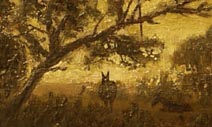
On May 31, 1995, Governor Mel Carnahan signed a bill designating the Missouri Mule as the official state animal. The mule is a hybrid animal, the offspring of a mare (female horse) and a jack (male donkey). The mule was introduced to the state in the 1820s and quickly became popular with farmers and settlers because of its strength and hardy nature. It was an appropriate choice for state animal as it reflects Missouri’s history as a large rural community, and as the “gateway to the West” the state was frequently the location where immigrants bought and filled the wagons – often pulled by mules – that would take them westward.
The high demand for the hardy animal prompted Missouri breeders to develop a larger draft mule. For decades, Missouri was the nation's premier mule producer. At one time forty-five percent of Missouri farmers were involved in the use or breeding of mules. The average farmer’s income at the turn of the century was around $700 a year. A pair of mule foals could be sold for $500 at this time so not only were they strong workers, but breeding mules was a lucrative side business for many farmers. Missourians marketed the mule to the Cotton Belt and to the lead, coal and logging industries. In addition, the Missouri mule played a critical role during both World Wars in moving troops and supplies. Eventually new technology diminished the mule’s importance and by 1940 the tractor had largely replaced the mule on the family farm.
The prestigious term, Missouri Mule, was said to have been coined at the 1904 World’s Fair in St. Louis when locally bred animals swept the competition in the six-mule wagon team. More than 1,000 mules were exhibited at the 1904 Fair from numerous states.
Associated with strength, endurance and honesty, the Missouri Mule is a symbol of the rich agricultural beginnings of the Show-me State. Today they are primarly used for recreation, although some are still used to work farms and forests.